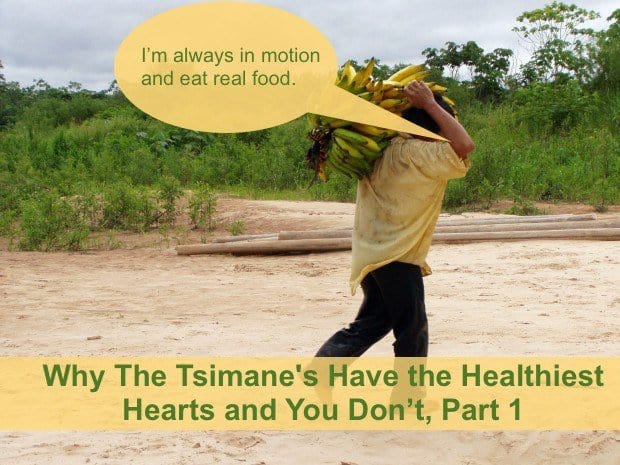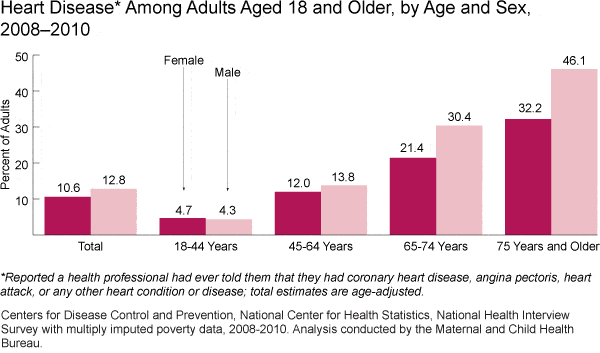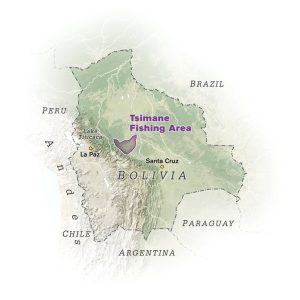Why The Tsimane’s Have the Healthiest Hearts and You Don’t, Part 1: The Evidence
How is it that the people with the world’s healthiest hearts watch no TV, eat mostly vegetarian and are always in motion? Read on…
PERHAPS YOU’VE never heard of them, but the world’s healthiest hearts beat in the people who live on a tributary of the Amazon River in Bolivia.
They’re called the Tsimane.
As Maggie Fox reports for NBC News, the research team who studied the Tsimane wrote:
“The Tsimane, a forager-horticulturalist population of the Bolivian Amazon with few coronary artery disease risk factors, have the lowest reported levels of coronary artery disease of any population recorded to date.”
The Tsimane have the healthiest hearts, researchers say, even when compared to the vaunted, long-lived, heart-healthy women of Japan. Tsimane men had lower coronary artery calcification scores than Japanese women, a population previously regarded as having the lowest coronary artery calcification scores reported for any ethnicity.
Why should you care?
Because of this graph:
Those numbers in the bar graph above are for adults in the United States, but similar numbers are evident in the rest of the industrialized world.
Two things that stand out in the graph:
- As we age, the incidence of heart disease increases dramatically, this being simply a function of bad habits having more time to create cardiovascular malfunction; and
- More men are affected by heart disease than women, which, by comparison, makes the heart health of the Tsimane men even more outstanding.
You do not want to be a number on that graph up there.
You want to be more like the Tsiamne, and this article and the forthcoming Part 2 will help get you there.
The researchers who studied the Tsimane point to two basic lifestyle factors that give them the healthiest hearts on the planet, which most likely, none of us share in combination:
- Their diet is plant dominant, whereas we eat lots of fast, convenient manufactured food; and
- They constantly move, whereas we sit all the time – to and from work, at work and whilst watching TV (an average of 5 hours per day for Americans).
Consider how a predominately plant-based diet and constant movement benefit the Tsimane:
- Most of them live their entire life without developing any coronary atherosclerosis, which has never before been seen in any prior research.
- Nearly none have any evidence of clogged arteries.
- 85% had no evidence of calcification in their arteries
The researchers studied 700 of the Tsimane. They scanned their arteries, testing for cholesterol in their blood and glucose. They measured blood pressure and looked for evidence of inflammation.
Calcium in the blood vessels was a particular focus, because it’s a signal that that artery-clogging fat has built up and hardened into plaques (which can break off and cause heart attacks and strokes) – but nearly none was found.
This is in remarkable contrast to those of use who live in the industrialized world where prolonged sitting and eating crap is the norm, which hugely contribute to chronic illness and death.
According to The Heart Foundation, in the U.S. cardiovascular diseases claim more lives than all forms of cancer combined, and killed almost 787,000 people alone in 2011.
In the United States, someone has a heart attack every 34 seconds. Every 60 seconds, someone in the United States dies from a heart disease-related event.
In contrast, an 80-year-old Tsimane has about the same heart and artery health as the average American in his or her 50s.
So, what do you do with this information?
What are you willing to do to have the heart of a Tsimane?
Are you willing to hunt for eight hours and cover 11 miles to get your meat, or canoe, walk or bike to get anywhere?
Are you willing to spend 90% of your waking hours doing physical activity?
That’s what the Tsimane do.
Dr. Tim Chico says he’s not, and undoubtedly you aren’t either; nor am I.
Dr. Chico is a cardiologist at Britain’s University of Sheffield. He was not part of the Tsimane study, but the aforementioned Maggie Fox quoted him to say:
“So, would I live like the Tsimane to reduce my risk of heart disease? No way, but what I would learn from them is that my risk of heart disease is largely determined by what I do, not what I am, and that I can greatly reduce my risk of developing a heart attack if I am regularly active, if I eat a diet rich in vegetables and low in processed foods, maintain a healthy weight, and don’t smoke.”
Which nicely segues to the next section, which I’ll present in Part 2 next week, where the following will be covered:
- How stress can break your heart, cause heart disease and stroke and what you can do about it;
- Foods that increase the risk of heart disease and stroke, and foods and supplements that help prevent them; and
- The minimal amount of movement that comes close to giving you the heart of a Tsimane.
We’re going to come up with a plan to make your heart among the healthiest in the world.
Stay tuned.
Read Part 2
Last Updated on February 7, 2024 by Joe Garma





